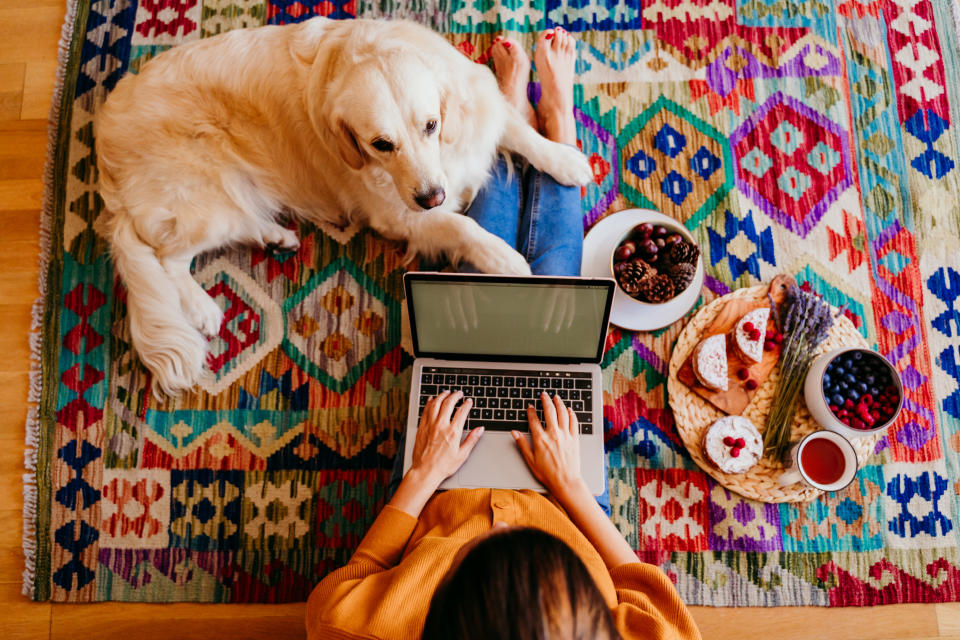How getting a dog during the pandemic may be beneficial for your health: 'Like a live-in therapist'

Earlier this month, the Washington Post reported a surge in dog adoptions and sales during the coronavirus pandemic, comparing it to past crazes like Tickle Me Elmo and Cabbage Patch Kids.
But unlike those toys, dogs are living, breathing animals who require frequent care and attention — and also return the favor to their owners. So as much of the country has been forced to isolate over the past five months to varying degrees, it makes sense that dogs can provide a real benefit to people spending more time at home.
August 26 is National Dog Day, and to celebrate man’s best friend, Yahoo Life spoke to Stanley Coren, a psychologist and dog-lover who’s written popular books like The Intelligence of Dogs and pens the Canine Corner column for Psychology Today. He broke down how a pet dog — not a cat, not a fish — could improve your mental and physical health during the pandemic.
Thinking about getting a dog? Use your cell phone to see what dog fits best in your home using augmented reality: Dalmatian, Pug, or German Shorthaired Pointer. Just place the below image - all three dogs are measured to-scale - in front of you.
“The dog is really like a live-in therapist,” says Coren. And like a therapist, talking to a dog is proven to be good for your health.
“There's lots of data which shows that people talk to their dogs and they do it in a variety of different ways,” he explains. “And they feel a lot better after.”
This can be helpful to people who are living alone, especially during the pandemic, Coren says. While a dog can’t respond, it serves as a sounding board for someone who otherwise may not have much interaction.
But a dog’s primary benefit is creating structure for its owners’ lives, something that is oftentimes needed given the uncertainty of everyday life right now.
Dog walkers in the time of corona might not get as many up-close admirers, but a walk “provides you with a little bit of exercise ... and an excuse for social contact with people outside of your bubble,” says Coren. “But [you’re] still being safe because you’re a leash-length distance away from the other person.”
For parents with kids at home, dogs have multiple advantages. “That dog’s going to provide some companionship for the child, so the child's not going to be moping around saying, ‘Why can't I go see my friends?’”
But beyond serving as a distraction, teaching a dog — and watching it learn — can accelerate young children’s emotional growth, which is especially important at a time when many classrooms are closed for in-person learning and playdates are off-limits.
“There's lots of data which says that kids who engage in part of the caretaking of a dog develop empathy much faster than kids who do not,” Coren says, referring to numerous studies. “And without interactions with their classmates, [a dog] might be the only interactions they get except with their parents, but of course, parents have a status differential, which distorts things.”
When asked if not only dogs but any pet could provide such help, Coren was unequivocal. “Dogs are better,” he explains, citing over 14,000 years of humans breeding dogs. The reason, he says, comes down to sociability.

“Part of the importance of a dog as a pet is they can read our signals and they recognize language,” Coren says. For example, if you point at something, dogs are one of the few domesticated animals who will look at what you are pointing at, instead of at your finger. On behalf of team canine, Coren says “dogs are much, much more sociable than cats.”
It’s this sociability asset that determines which type of dog is best suited for COVID-19 times. Coren thinks “sucky face dogs,” or dogs prone to tender acts of slobbering, would make for the best companions right now: Labradors, retrievers, beagles and pointers are some examples.
Coren’s own dogs have been a welcome presence during this time. He is isolating from his wife, who’s taking care of their granddaughter at their farmhouse outside Vancouver, British Columbia, where he resides.
Thankfully, he has Ripley, his Cavalier King Charles spaniel, and Ranger, his Nova Scotia Duck Tolling retriever, by his side. In addition to keeping him company, they also serve as silent, unwitting supporters of his writing.
“When I want somebody to talk to and not contradict me, or I want to say, ‘Listen to this paragraph, does it sound as stupid as it looks on the page?’ I'll read it to them and feel better afterward,” Coren says.
For the latest coronavirus news and updates, follow along at https://news.yahoo.com/coronavirus. According to experts, people over 60 and those who are immunocompromised continue to be the most at risk. If you have questions, please reference the CDC’s and WHO’s resource guides.
How to maintain your physical and mental health during the pandemic
Taking care of a loved one with COVID-19? Here’s how to stay healthy.
Q&A with Dr. Kavita Patel: How to keep your family safe and maintain your mental health
Read more from Yahoo Life:
Want daily lifestyle and wellness news delivered to your inbox? Sign up here for Yahoo Life’s newsletter

 Yahoo Sports
Yahoo Sports 

